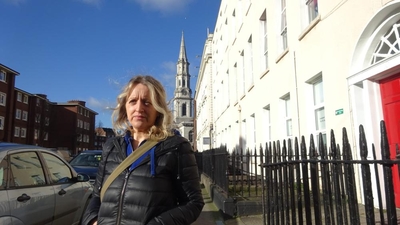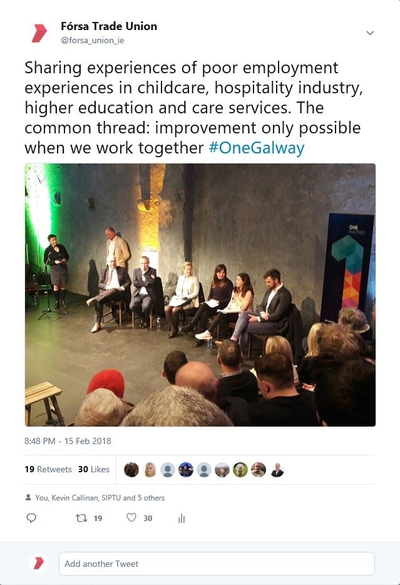Stage notes on addiction
Fórsa member Lisa Walsh readies for tour of new play
by Niall Shanahan
 Love In The Wild is a new play written by Lisa Walsh, and opens next month at the Axis theatre in Ballymun. Lisa is a member of Fórsa and a social worker in child protection services. We met last week to talk about her inspiration for the play, its development from page to stage, and her desire to challenge the stigma of addiction. Love In The Wild is a new play written by Lisa Walsh, and opens next month at the Axis theatre in Ballymun. Lisa is a member of Fórsa and a social worker in child protection services. We met last week to talk about her inspiration for the play, its development from page to stage, and her desire to challenge the stigma of addiction.
 Love In The Wild is a new play written by Lisa Walsh, and opens next month at the Axis theatre in Ballymun. Lisa is a member of Fórsa and qualified as a social worker as a mature student in 1999. She is currently working in child protection having previously worked as a medical social worker and an addiction worker. Love In The Wild is a new play written by Lisa Walsh, and opens next month at the Axis theatre in Ballymun. Lisa is a member of Fórsa and qualified as a social worker as a mature student in 1999. She is currently working in child protection having previously worked as a medical social worker and an addiction worker.
We met last week to talk about her inspiration for the play, its development from page to stage, and her desire to challenge the stigma of addiction.
“The play is a one-man show about a man called Ger Duffy. He’s from Ballymun on Dublin’s north side. He’s on a methadone programme and he’s journeying through addiction and through big changes in his life.
“He has a strong connection to wildlife and nature, which helps explain how he sees the world, a way that’s quite different to how most people see it.
“The play is about love, it’s about judgment but hopefully it’s also about redemption. He’s not the stereotype of an addict, there are many layers to Ger and many layers to his story,” Lisa explained.
Inspiration
Ger’s experience was informed and inspired by Lisa’s work in addiction services over the last 20 years. While taking part in a creative writing course five years ago, Lisa recalled a story she’d heard about one addict’s experience of visiting Ballymun swimming pool 20 years previously.
“The swimming pool was a huge feature of life for anyone who grew up in Ballymun. Swimming and Chester slices - the cakes we had after we went swimming – were a big part of the Ballymun childhood.
“He went back as an adult for a swim but he left because he became very self-conscious of being - as he called himself - a ‘junkie’. It stayed with me and came back to me when I started writing,” she said.
The play has toured in a number of addiction centres in Dublin. Lisa said the response to those performances helped to inform the development of the play. “One man told me ‘We’ve all had that walk of shame, where we were walked out of places, security man would come over and put his hand on your shoulder.’ When he described that I knew we were on to something, because it’s trying to give a voice to that experience.”
Lisa said it made her think about Ballymun and the experience of stigma. “I grew up with a lot of stigma myself, my mam had addiction problems. When I started to write lots of things came back to me, like my experience of being a little girl with my mam, and the way people treated her, and later looking at the experience of people when I worked in addiction services. It’s why I was drawn to social work in the first place.”
Love in the Wild is performed by Anto Seery, directed by Peter Sheridan and produced by Sheila & Peter Sheridan.
The play opens in the Axis theatre in Ballymun on Thursday 8th March (International Women's Day) and will tour throughout March in a number of Dublin venues.
Watch the trailer here.
More information on dates, venues and booking here.

Love in the Wild is performed by Anto Seery
 |
|
125 extra staff needed to avoid potential doubling of driving test waiting times
by Bernard Harbor
Fórsa has called on the Government to allocate funds to hire up to 125 additional driver testers to deal with an inevitable surge in demand for driving tests on foot of proposed new sanctions on car owners who allow their vehicles to be used by unaccompanied learner drivers.
Fórsa has called on the Government to allocate funds to hire up to 125 additional driver testers to deal with an inevitable surge in demand for driving tests on foot of proposed new sanctions on car owners who allow their vehicles to be used by unaccompanied learner drivers. The union says measures in the amended Road Traffic Bill could double demand in the short term, potentially increasing driving test waiting times to as long as 55 weeks.
Once enacted, the legislation will introduce fines of up to €2,000, or six months imprisonment, for motorists who allow their vehicles to be used by unaccompanied learner drivers. The bill will also allow the detention of vehicles illegally driven by learner drivers.
Fórsa says the Government must act now to deal with a sudden and substantial increase in demand. The union wants 25 extra driver testers to be employed on a permanent basis to cover an existing increase in demand for tests. And it has called for provision for another 100 to be hired on temporary contracts if demand surges, as expected, in response to the Road Traffic Bill.
The union says the number of driver-testers has fallen by almost 20% since 2007 and is now incapable of meeting underlying – let alone increased – demand. It says average waiting times have already risen to 14 weeks on foot of the economic recovery. This is four weeks more than the Road Safety Authority’s 10-week target, which was previously being met.
Fórsa official Ashley Connolly criticised as “wholly inadequate” Government plans to recruit just five additional testers from a competition that recently attracted over 4,300 applicants. She said additional recruitment would reduce waiting times and improve road safety at no additional cost to the taxpayer, because the service has been self-funding since 2014.
“Fórsa supports the measures in the Road Traffic Bill because they will improve road safety. But urgent steps are required to prevent a huge backlog of driving tests and a potential trebling of waiting times. Over 4,000 people recently applied when driver-tester jobs were advertised. Why not use that opportunity, and make provision for the recruitment of the number of testers – permanent and temporary – needed to deal with the fall-out of the legislation, as well as ongoing understaffing and the underlying growth in demand for driving tests?” she asked.
Ms Connolly said the union had discussed other ways of reducing waiting times with the Road Safety Authority, and was willing to look at additional productivity measures. “The fastest, safest, and cheapest solution is to make provision to directly hire and train up to 100 additional driver-testers on 2-3 year temporary contracts to deal with the expected surge in demand, and to hire 25 more on a permanent basis to deal with increased underlying demand. The number of driver testers has fallen from 126 in 2007 to only 102 today,” she said.
Fórsa acknowledged that the Road Safety Authority had sought sanction to hire additional testers, but said the response from the Department of Transport and Department of Public Expenditure and Reform was inadequate. The union also says the Government could sanction the temporary re-hire of suitable retirees to help deal with a temporary demand surge.
The Road Safety Authority raises revenue through the €85 price of a driving test, plus revenue raised through the theory test, NCT test and the national driving licence service.
- There were 126 driver testers in 2007, and just 102 at the end of 2016.
- The average waiting time is now 14 weeks.
- In 2007, the average waiting time was almost 19 weeks. That was brought down to below 10 weeks by 2010, but has risen again due to staffing shortages, the economic recovery and rumours of legislative changes.
- Over 80,000 candidates are waiting for tests.
- Customer cancellation and ‘no show’ rates have fallen from 20% to about 12%, with the cooperation of driver testers.
- A job advertisement for driver testers recently attracted over 4,380 applications. But the Department of Transport has only given sanction to recruit six additional testers.
|
eir subsistence rates restored
by Eugene Quinn
Subsistence rates in the telecoms company eir are to be restored to their value after management conceded a Fórsa claim.
Subsistence rates in the telecoms company eir are to be restored to their value after management conceded a Fórsa claim. The restoration will take place in two stages, with 34% due from 1st January 2018 and the rest from 1st July 2018.
Meanwhile, the union has complained that new on-call and call-out rates, which were agreed in November 2016, have still not been posted on the eir intranet. Some staff are now owed arrears. A copy of the agreement has been forwarded to HR in Tech Mahindra, where the union also has members.
In other news, Ian Patel was elected branch chairperson, John Fay was elected branch secretary, and Barry Sweeney was elected branch treasurer at the eir AGM, which took place last month.
Fórsa member appointed to ITF role
by Niall Shanahan
The International Transport Workers’ Federation (ITF) has announced the appointment of Eoin Coates to the post of assistant secretary in the ITF’s Civil Aviation Tourism Services section.
The International Transport Workers’ Federation (ITF) has announced the appointment of Eoin Coates to the post of assistant secretary in the ITF’s Civil Aviation Tourism Services section.
Eoin, a member of Fórsa’s Cabin Crew branch, was an active member of the branch committee. He took up his new post at the ITF at the beginning of February.
Announcing Eoin’s appointment, ITF civil aviation secretary Gabriel Mocho Rodriguez said, “Eoin brings a wealth of experience to our sections. He has worked as cabin crew for the past few years in Aer Lingus, and previous to this flew for Ryanair. He has a degree in political science and is currently pursuing a masters degree in humanitarian and human rights law.”
Fórsa head of division Angela Kirk added, “We wish Eoin well in his new appointment and we look forward to working closely with him at an important time for trade unions in aviation.”
Fórsa meets Pay Commission
by Bernard Harbor
The Public Service Pay Commission (PSPC) says it has received a large number of submissions from unions on the issue of civil and public service recruitment and retention issues. These include submissions from Fórsa on problems in the civil service and among health and social care professionals.
The Public Service Pay Commission (PSPC) says it has received a large number of submissions from unions on the issue of civil and public service recruitment and retention issues. These include submissions from Fórsa on problems in the civil service and among health and social care professionals.
At a recent meeting with unions and officials from the Department of Public Expenditure and Reform (DPER), the PSPC said it had now sought submissions from public service employers. It has also commissioned independent research.
The Commission says it is not contemplating oral presentations at this stage, but it may seek clarification of aspects of the submissions it has received.
Last November, the PSPC issued a written statement setting out its approach to the work. It aims to report on issues relating to nursing, consultants and junior doctors by the end of June 2018, and to report on other staff groups outlined in its initial report by the end of this year.
In a related development, the finance minister ruled out the introduction of Dublin allowances when he spoke to the Oireachtas finance committee last week. Paschal Donohoe told the committee that staff retention was a bigger problem than recruitment, particularly in the capital.
Read the PSPC statement of approach here.
Childcare price disparities grow
by Diarmaid Mac A Bhaird
The cost of childcare in Dublin is significantly higher than in other parts of the country, according to a new report by the union-backed Nevin Economic Research Institute (NERI).
The cost of childcare in Dublin is significantly higher than in other parts of the country, according to a new report. The study of the affordability of childcare in Ireland finds that full-time childcare for one child in Fingal costs 40% of a medium-earning worker’s net income.
Published by the union-backed Nevin Economic Research Institute (NERI), the study also found that full-time childcare for two children anywhere in Dublin costs more than the net income of a minimum wage earner.
The report examined part-time and full-time childcare costs for one-parent families with one child, and households with two children and two earners. Leitrim had the lowest average full-time childcare costs, while Dun Laoighaire-Rathdown is the most expensive.
Rural counties generally had much lower childcare costs, but the report warned that a national 4.3% rise in the price of childcare “masks” regional disparities.
The study also discusses the wider economic repercussions of the high cost of childcare in Ireland. The authors speculate that it has a detrimental effect on employment because it limits participation in the workforce.
“Ireland has some of the highest costs for full-time childcare as a proportion of disposable income in the OECD and one of the lowest spends on early childhood education as a proportion of GDP,” it says. It also suggests that increased spending on early childhood education results in long-term economic gains.
Last December, an advisory note on pay bargaining by ICTU’s Private Sector Committee highlighted “excessive” childcare costs. IMPACT – one of the three unions that recently merged to create Fórsa – had earlier made a budget submission, which called for increased spending on early childhood education following years of underinvestment.
Pilots back Aer Lingus pay review
by Niall Shanahan
IALPA confirmed last Friday (16th February) that a majority of members voted in favour of a new pay and productivity deal with Aer Lingus.
IALPA confirmed last Friday (16th February) that a majority of members voted in favour of a new pay and productivity deal with Aer Lingus. It's been reported that the deal provides for 10.9% pay increases over 33 months, dating back to last year.
In a statement issued by IALPA its president, Captain Evan Cullen, said: “The implementation of this agreement will more than address the financial losses our members have felt since the economic crisis and will reward them for the hard work they put in to make sure Aer Lingus has become the success it is today.
“This agreement between Aer Lingus and their pilot body will only strengthen their position in the aviation world, especially as they look to expand their horizons over the next few years,” he said.
IALPA is the professional representative body for airline pilots in Ireland, and a branch of Fórsa.
Fórsa audio news bulletin
|
CE Supervisors AGM
The annual general meeting of Fórsa’s CE Supervisors’ branch will take place on Tuesday 13th March at Fórsa’s office in Nerney’s Court at 1.30pm.
The annual general meeting of Fórsa’s Community Employment (CE) Supervisors’ branch will take place on Tuesday 13th March 2018 at Fórsa’s office in Nerney’s Court, Dublin at 1.30pm.
Branch secretary Paddy Quinn advises that nominations for the positions of branch chairperson, vice chairperson, branch secretary and branch treasurer must be received no later than Friday 2nd March.
Positions on the branch committee, on a geographic basis, will be proposed and elected from members in attendance at the AGM.
Nominations for the posts should be sent by post to the following address:
P Quinn (branch secretary)
3 Hillview
Mountrath Road
Portlaoise
Co. Laois
R32 CX5W
Survey results: Will a robot take your job?
In the last edition of the news bulletin we asked Fórsa members if they had concerns that a robot might eventually take over their job.
In the last edition of the news bulletin we asked Fórsa members if they had concerns that a robot might eventually take over their job.
Of those who took the survey, 51% of respondents said they weren't worried about their own job, but they were concerned for others, while 41% confidently stated that a robot could not do their job.
A few people have genuine concerns, with just 8% stating that their job is likely to be automated in the future.
The automation of work and the development of Artificial Intelligence (AI) technology is an issue of growing interest for Fórsa. Both developments present huge challenges for workers and unions, and we will bring you more on this in the coming months as part of the Fórsa Insights podcast series.
‘Room to improve’ on gender pay reporting - Eurofound
Report says evaluations in the four sample EU states point to a ‘bumpy ride’ in terms of gender pay gap reporting compliance.
As the focus on the gender pay gap continues, the European Foundation (Eurofound) has produced a report reviewing the experiences in four member states – Austria, Denmark, Sweden and Finland – based on their company-level gender pay reports and audits.
The report follows the European Commission’s announcement last November that further targeted measures to improve gender pay transparency may be needed at EU level.
Eurofound’s report says evaluations in the four sample states point to a ‘bumpy ride’ in terms of compliance, at least in the initial phase of rolling out the instruments in some countries. It says there’s “room for improvement in engaging employee representatives and in raising employees’ awareness.”
It says the success of any measures depend on “the extent to which the existence of unjustified gender pay gaps is acknowledged” by the various actors involved, and their willingness to engage in a meaningful dialogue and follow-up.
The Gender Pay Gap Information Bill 2017 was accepted by the Irish Government last October. The Bill, which was backed by a strong Fórsa campaign, assigns new powers to make mandatory information disclosure schemes, compelling businesses to publish details on what they pay men and women.
After extensive lobbying on the issue last year, Fórsa continues to actively engage with stakeholders within and beyond Leinster House. Discussions between Congress and the employer group Ibec are at an advanced stage. It is now expected that an agreed employer-union position will emerge from these talks.
Fórsa continues to engage with other unions and advocacy groups on the issue.
The Eurofound report is available here.
Trade unions and students launch One Galway
by Niall Shanahan
The ONE Galway initiative was launched last week (Thursday 15th February) with a packed house at the Mick Lally Theatre in Galway City.
The ONE Galway initiative was launched last week (Thursday 15th February) with a packed house at the Mick Lally Theatre in Galway City.
The project is a collaborative initiative comprising trade and student unions operating in the Galway area, supported by the Irish Congress of Trade Unions and the Galway Council of Trade Unions.
Fórsa deputy general secretary Kevin Callinan, who was one of the speakers at the event, explained: “The aim of the project is to foster a deeper engagement and collaboration between trade unions, student unions and community groups at workplace and societal levels to organise, campaign, educate and communicate with workers and the wider community.
“Building on the successful model established by the ONE Cork initiative, launched in 2016, ONE Galway is about organising workers, their families and communities to influence change and create a future within which there is access to decent work, decent pay and a decent standard of living for all,” he said.
Precarious work
The initial campaign focus for ONE Galway will be on precariousness and the exploitation of workers. The launch event featured a strong presentation on the issue from Dr Michelle O’Sullivan of the University of Limerick.
In her presentation, Dr O’Sullivan said “Precariousness, at its heart, is about uncertainty, and every problem, every poor outcome that workers have is because of uncertainty. Whether its hours, job or social insecurity, it’s about uncertainty.”
Dr O’Sullivan said many employers like to think of full-time, permanent jobs as something “of the past” and said she was “highly sceptical” when employers claimed that millennials were no longer interested in full-time, permanent jobs. She said it was important to challenge the claim that more secure working arrangements was a thing of the past.
Members of the audience joined the discussion to share their experiences of poor quality employment in childcare, the hospitality industry, higher education and in care services. Most of the contributions emphasised that improvement is only possible when people work together to secure them.
Campaigns
While similar to the Cork initiative, ONE Galway’s focus lies in a broader organisational engagement from the outset, where student unions are working alongside their trade union counterparts on campaigns such as housing needs, in addition to the campaign focus on precarious working.
Joe Cunningham, the general secretary designate of SIPTU, said: “ONE Galway will also work to better equip and increase the capacity of the trade union movement in Galway city and county to deal together with the many different challenges which face workers, particularly students, younger workers and those from our migrant communities.”
Kevin added: “It’s about consolidating the strength, resources and expertise locally of all these organisations and building a stronger network to improve living and working conditions and achieve significant gains for all workers through greater trade union and civic participation.”
  
Fórsa FAQs
your questions answered
|
|
|